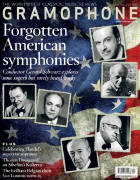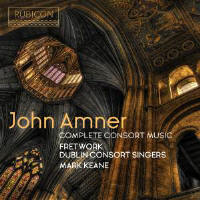Texte paru dans: / Appeared in: |
|
|
Outil de traduction (Très approximatif) |
|
|
Reviewer: Alexandra Coghlan A near-contemporary of Gibbons, Tomkins and Weelkes, John Amner (1579-1641) left just one publication behind at his death (though a generous selection of other works have been preserved and subsequently edited). His Sacred Hymns of 3, 4, 5 and 6 parts for Voyces and Vyols was printed in 1615 and its contents, recorded here in full by Fretwork and the Dublin Consort Singers, offer a good introduction to the composer, ranging from simple, declamatory early settings to elaborate five-part polyphony and accompanied verse anthems. At first listen it’s hard to find that distinctive musical identity that, within just a few bars, sets a Weelkes or Gibbons motet apart. But if Amner’s stylistic voice is more anonymous, his skill is significant. The three-voice Distressed soul finds some unexpected harmonic colours in its intimate portrait of human grief. Sin is, by turns, repugnant, poignant and overwhelming, and the music eventually collapses into ever more drawn-out suspensions, wailing cries of ‘aye me’. Come let’s rejoice, by contrast, is an ebullient romp of an anthem in the tradition of Byrd’s Sing joyfully, bright with antiphonal effects and chattering delight. Most impressive are the pair of five-voice anthems Thus sings that heavenly quire and The heavens stood all amazed, which blend madrigalian word-painting with intricate counterpoint, moving between imitative counterpoint and more Italianate antiphony, as well as the verse anthems O ye little flock, with its neatly characterised and differentiated solo verse sections, and Consider, all ye passers by, which sets a solo tenor against a full five-voice texture. Performances by the Dublin Consort Singers are neat and carefully shaped by director Mark Keane, the tone throughout clean and unfussy. Fretwork are a luxury addition for the verse anthems, and a Galliard and more extended Pavan give them a chance to get their teeth more thoroughly into music that, if not of the urgent first rank of the period, has plenty of quiet charm to recommend it. A somewhat terse booklet note by Keane himself rather short-changes the music. Anyone curious should consult the much more detailed account in Anthony J Greening’s Grove entry. |
|




